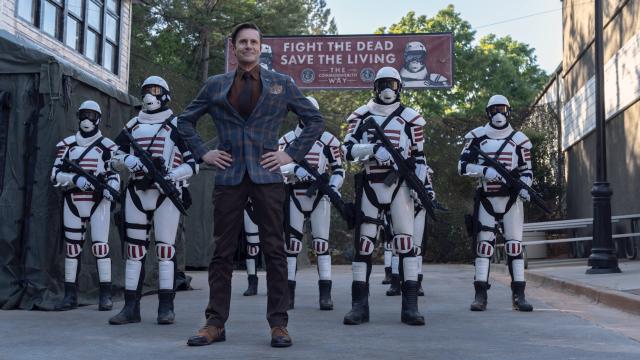Over the course of 12 long years, The Walking Dead TV series has had many highs and many more lows. Now, as the venerable zombie apocalypse show approaches its end, the 11th and final season has been as consistently strong as TWD has been in years. While it may seem odd — and, frankly, frustrating — for the show to suddenly get its collective shit together right at the end, it’s no mystery, because the answer comes right from Robert Kirkman’s original Walking Dead comics.
No spoiler warning is needed. I’ve tried to avoid learning much about the comics at all so I wouldn’t constantly be comparing the show to its source material. However, when the comic ended back in 2019, I learned enough to get a general sense of where the story would wrap up. The answer is the Commonwealth, a city — seemingly the only city in the world of TWD — that has managed to return to a pre-apocalyptic society. It has a government, money, a high-functioning hospital, record stores, and ice cream stands, along with near-total protection from zombies and post-apocalyptic arseholes by a well-armed standing army.
I can’t speak to the reason why Kirkman chose to shake up his narrative by bringing a concept so familiar yet totally foreign to the narrative, but I suspect it was to shake up the series’ storytelling after a decade-and-a-half-plus of Rick Grimes and his crew battling a wide and increasingly deadly assortment of those aforementioned post-apocalyptic arseholes. The Commonwealth is completely different from the foes that have come before. It’s not made up of cannibals, bullies, or loony zombie cosplayers; it’s made of people, like Alexandria or any real-world town, albeit with soldiers wearing Stormtrooper-esque armour. These people aren’t scrambling to get by, and the Alexandrians have absolutely nothing worth taking anyway, so there’s no reason for the two communities to get into one of TWD’s traditional fights to the death.
This has allowed The Walking Dead (the TV series, but also presumably the comics) to completely shake things up by sticking its characters back in an approximation of the real world. It’s still wild to see these characters, who we’ve seen having to endure unspeakable hardships, brutality, and flesh-eating zombies for more than a decade, suddenly going to a record store and buying an album, awaiting surgery in a hospital full of modern supplies, and, most surreally, sitting in a waiting room with a coffee table with magazines on it. The most banal moments of season 11 have also been some of TWD’s most powerful, not least because it’s even more surreal for the characters to find themselves in this new/old world. It’s a classic fish out of water story. (Or should I say fish suddenly thrown back into the water?)
But the greatest thing about the introduction of the Commonwealth has been all the new storytelling opportunities it’s brought. By shaking up the setting so thoroughly, The Walking Dead has been able to put its characters in new situations, and has taken every opportunity to do so. In a city with politics, you can have a political thriller or a conspiracy story. In a town with upper-class citizens and cash, you can send them on a heist. In a setting that’s finally settled down into some semblance of normalcy, you can wonder who killed somebody and why without the answers always being, “Practically anybody” and “who cares?”
Furthermore, the Commonwealth storyline has managed to upend the survivors-vs.-other-group-of-survivors conflicts that have dominated so much of the series. The Commonwealth isn’t an “Other.” It’s 50,000 people, most of whom are happy to be living in peace and safety. It’s where many Alexandrians have moved during the last eight episodes, including Carol, Ezekiel, Daryl, Rosita, and more. While the government that runs the Commonwealth is incredibly classist and elitist and the soldiers more than a little fascist, the vast majority of its inhabitants have no ill will towards our heroes at all.
Of course, the people that do bear ill will to our heroes also happen to be the ones in power, which is why the brewing conflict finally bubbled over in last Sunday’s episode. There’s Governor Pamela Milton, outraged that revolution seems to be brewing in the city. There’s her son Sebastian, aka Kingsley St. Buffingsworth of the Cape Cod Buffingworths, who abuses his station, especially at the expense of those who threaten it. And then, of course, there’s Deputy Governor Lance Hornsby, who’s been secretly “resettling” members of the Commonwealth who “don’t do their part” to unknown locations and fates, who’s been funelling money and weapons to some secret project the government isn’t aware of but is almost certainly nefarious. Oh, and in the final moments of the mid-season finale, he straight-up conquered Alexandria, Hilltop, and Oceanside (in what seems to be a highly misguided grab for power). He used banners and everything.
When The Walking Dead returns in the fall, the Alexandrians won’t be fighting the Commonwealth. Maggie, Daryl, Rosita, Aaron, Gabriel, Lydia, and Negan will be fighting Hornsby and his many, many minions. Meanwhile, Ezekiel, Eugene, Yumiko, Magna, Connie, and Kelly are all inside the Commonwealth, fomenting revolution and getting ready to overthrow its autocracy. (Carol is currently serving as Hornsby’s agent, and she’s going to mess him up good.) Basically, these two groups will both be fighting the Man, a battle I’ve never, ever seen on the show.
After 12 years, I can’t imagine watching the series finale of The Walking Dead and being left wanting more. And lord knows even season 11 hasn’t been perfect, especially when it started. But if the show manages to go out reminding us why it was once one of the most popular TV series ever, zombie or otherwise, well, I wouldn’t mind that at all.
Wondering where our RSS feed went? You can pick the new up one here.
